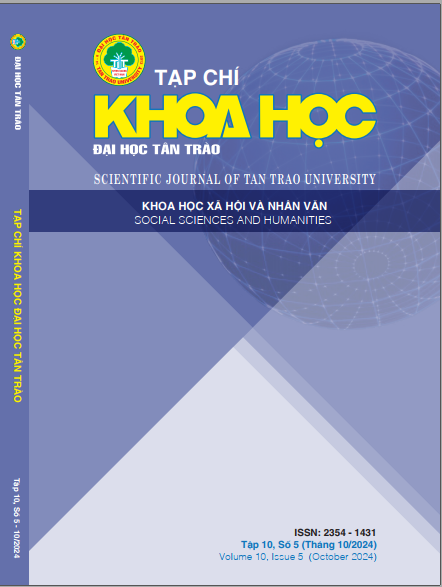EVALUATING THE QUALITY OF ORGANIZATIONAL CULTURE AT FACULTY OF LEGAL ENGLISH FOREIGN LANGUAGES AT HANOI LAW UNIVERSITY
DOI:
https://doi.org/10.51453/2354-1431/2024/1253Abstract
The study focuses on the role and importance of organizational culture at the faculty of Legal Foreign Languages at Hanoi Law University in creating a professional, effective, and sustainable working environment. Organizational culture is not only about values and behavioral norms but also affects the quality of teaching, research, and relationships between lecturers, staff, and students. The study employed a mixed-method approach, including a quantitative survey with a 45-item questionnaire based on the Likert scale and semi-structured interviews. Data were collected from 16 lecturers and analyzed using SPSS v.27 and NVivo v.14 software to assess factors influencing organizational culture. Factors such as the work environment, communication, leadership support, and policy transparency directly impact lecturers' satisfaction and commitment. However, issues such as limited internal communication, lack of support for career development, and rigid work processes still exist. The study confirms that a positive organizational culture enhances the quality of teaching, research, and cohesion within the department. To improve, efforts should focus on enhancing communication, ensuring policy transparency, and encouraging creativity. The study provides practical solutions to improve organizational culture, contributing to the development of an effective work environment, increased competitiveness, and sustainable growth for the Faculty of Legal Foreign Languages, and a useful reference for other higher education institutions.
Downloads
References
Cameron, K. S., & Quinn, R. E. (2011). Diagnosing and Changing Organizational Culture: Based on the Competing Values Framework. Jossey-Bass.
Cameron, K. S., & Quinn, R. E. (2011). Diagnosing and Changing Organizational Culture: Based on the Competing Values Framework. Jossey-Bass.
Dao, M. T., & Nguyen, T. N. (2020). Building Workplace Culture in State Administrative Agencies. State Management Journal, 7, 28-30. https://www.quanlynhanuoc.vn/2020/09/10/xay-dung-van-hoa-cong-so-trong-cac-co-quan-hanh-chinh-nha-nuoc/
Dörnyei, Z., & Dewaele, J.-M. (2022). Questionnaires in Second Language Research: Construction, Administration, and Processing (3rd ed.). Routledge. https://doi.org/10.4324/9781003331926
Huynh, V. T. (2016). Public Service Culture in Vietnam - Theory and Practice. Political Theory Publishing House, Hanoi.
Kinicki, A., & Fugate, M. (2018). Organizational behavior: A practical, problem-solving approach. McGraw-Hill.
Le, T. M. (2021). Theoretical Issues on Workplace Behavior Culture and Social Media Behavior Culture in Vietnam. Political Theory and Communication Journal. https://lyluanchinhtrivatruyenthong.vn/video-detail/mot-so-van-de-ly-luan-ve-van-hoa-ung-xu-noi-lam-viec-va-van-hoa-ung-xu-tren-mang-xa-hoi-tai-viet-nam-p24965.html
Munir, M., & Arifin, S. (2021). Organizational Culture and Impact on Improving Employee Performance. Journal of Social Science Studies (JOS3), 1(2), 65-68. https://doi.org/10.56348/jos3.v1i2.15
Nguyen, H. H. (2016). Factors Affecting Workplace Culture in State Administrative Agencies. State Organization Journal. https://tcnn.vn/news/detail/33619/Nhung_nhan_to_anh_huong_den_van_hoa_cong_so_trong_cac_co_quan_hanh_chinh_nha_nuocall.html.
Nguyen, V. H., & Nguyen, L. (2023). Current Situation and Solutions for Improving Organizational Culture in Universities: A Case Study at Vietnam National University Ho Chi Minh City. Education Journal, 19(11), 63-67. https://doi.org/10.15625/2615-8957/12311110
Nguyen, T. T., Le, T. L. (2021). Workplace Culture in Universities: A Case Study at Vietnam National University of Agriculture. Education Journal, 503(1), 58-63., 58-63. https://tcgd.tapchigiaoduc.edu.vn/index.php/tapchi/article/view/149
Nguyen, H. P. (2020). The Role of Workplace Culture in the Development of Public Administration in Vietnam Today. Communist Review. https://www.tapchicongsan.org.vn/web/guest/nghien-cu/-/2018/816930/vai-tro-cua-van-hoa-cong-so-voi-su-phat-trien-nen-hanh-chinh-cong-vu-o-nuoc-ta-hien-nay.aspx
Schein, E. H. (2010). Organizational Culture and Leadership. Jossey-Bass.
Tadesse, B. A., & Debela, K. L. (2024). Organizational culture: a systematic review. Cogent Business & Management, 11(1), 1-23. https://doi.org/10.1080/23311975.2024.2340129
Tierney, W. G. (1988). Organizational Culture in Higher Education: Defining the Essentials. The Journal of Higher Education, 59(1), 2-21. https://doi.org/10.2307/1981868
Tran, T. G. (2023). Building Workplace Culture According to the Spirit of the 13th Party Congress Resolution. Political Theory Journal, 56. https://lyluanchinhtri.vn/xay-dung-van-hoa-cong-so-theo-tinh-than-nghi-quyet-dai-hoi-xiii-cua-dang-6190.html
Vu, V. T., & Vu, D, N. (2022). The Issue of Building Workplace Culture Today. Labor Science Research Journal, 21(1), 28-32. https://vjol.info.vn/index.php/DHCD/article/view/67074
Downloads
Published
How to Cite
Issue
Section
License

This work is licensed under a Creative Commons Attribution-ShareAlike 4.0 International License.
All articles published in SJTTU are licensed under a Creative Commons Attribution-ShareAlike 4.0 International (CC BY-SA) license. This means anyone is free to copy, transform, or redistribute articles for any lawful purpose in any medium, provided they give appropriate attribution to the original author(s) and SJTTU, link to the license, indicate if changes were made, and redistribute any derivative work under the same license.
Copyright on articles is retained by the respective author(s), without restrictions. A non-exclusive license is granted to SJTTU to publish the article and identify itself as its original publisher, along with the commercial right to include the article in a hardcopy issue for sale to libraries and individuals.
Although the conditions of the CC BY-SA license don't apply to authors (as the copyright holder of your article, you have no restrictions on your rights), by submitting to SJTTU, authors recognize the rights of readers, and must grant any third party the right to use their article to the extent provided by the license.


